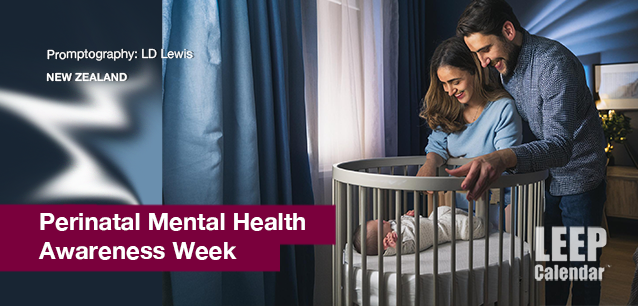 AD
AD
Today is: December 05
Scroll to explore events active on this date.
LEEP INK FEATURES

August? Absolutely!
In August, we live through the Dog Days of Summer. It's hot and often humid, and those who can leave for better climates do. Down south, winter is in full force. August is also known as "the ...

In The Heat of July: July 2025 Events
Is it hot enough (or cold enough if you're below the equator) for you yet? There is actually a day for that! Like every month, I pick a diverse collection of events you may or may not know about. This ...

May Blooms: Events in May 2025
Along with October, May is one of the most densely packed months of the year. It's before the summer humidity and the last whole month of the school year. The weather is warming in t...
About Perinatal Mental Health Awareness Week in Australia
Children , Family & Friends
Australia
Ends: May 05, 2024
DESCRIPTION:
PERINATAL MENTAL HEALTH AWARENESS WEEK IN NEW ZEALAND
Perinatal Mental Health Awareness Week in New Zealand focuses on raising awareness about the mental health challenges faced by parents during the perinatal period, encompassing pregnancy and the first year after birth. This week educates the public, healthcare professionals, and policymakers about the significance of perinatal mental health and advocates for better support and resources for affected individuals and families.
Perinatal Mental Health Awareness Week aims to improve awareness and understanding of perinatal mental health conditions among the general public and healthcare providers in New Zealand to reduce the stigma associated with these conditions, encourage parents to seek help and promote the availability of resources and support.
The week advocates for systemic changes in treating perinatal mental health issues, including improving screening and treatment options for conditions in addition to more significant investment in mental health services. Ultimately, the goal is to ensure that all parents in New Zealand receive the support they need to maintain their mental health and well-being during the perinatal period.
WHAT IS "PERINATAL?"
The term "perinatal" refers to the period surrounding birth. It typically includes the time from the 22nd week of gestation (approximately the sixth month of pregnancy) to seven days after birth. However, in broader contexts, it can sometimes extend to cover the entire duration of pregnancy and the first year after birth.
In the context of perinatal mental health, it encompasses mental health conditions that occur during pregnancy (antenatal) and the postpartum period (after childbirth), highlighting the significance of mental health care throughout this critical time for both the parent and the baby.
TOP FIVE MOST COMMON PERINATAL CONDITIONS
Perinatal mental health conditions are mental health issues that occur during pregnancy and the first year after childbirth. The top five perinatal mental health conditions are:
Perinatal Depression—Perinatal depression includes both antenatal depression (during pregnancy) and postpartum depression (after childbirth). Symptoms can range from sadness and fatigue to severe mood swings and inability to bond with the baby. It affects many new mothers and, in some cases, fathers.
Perinatal Anxiety—This condition includes generalized anxiety disorder, panic disorder, and obsessive-compulsive disorder (OCD) that occur during the perinatal period. Symptoms include excessive worry, fear, and intrusive thoughts, which can significantly impact a parent's ability to function.
Postpartum Psychosis—A rare but severe mental health condition that usually develops within the first few weeks after childbirth. Symptoms include hallucinations, delusions, severe mood swings, and confusion. Postpartum psychosis requires immediate medical attention as it can pose severe risks to both the mother and the baby.
Post-Traumatic Stress Disorder (PTSD)—PTSD can occur after a traumatic childbirth experience. Symptoms include flashbacks, nightmares, severe anxiety, and avoidance of reminders of the traumatic event. This condition can affect a parent's ability to care for their baby and engage in daily activities.
Perinatal Bipolar Disorder—Bipolar disorder can be triggered or exacerbated by pregnancy and childbirth. Symptoms include extreme mood swings that range from manic episodes (high energy, euphoria, or irritability) to depressive episodes (low energy, sadness, or hopelessness). Proper management and treatment are crucial for the well-being of both the parent and the baby.
These conditions require timely recognition and appropriate treatment to ensure the health and well-being of both the parent and the child.
THE EVENT'S HISTORY
Perinatal Mental Health Awareness Week was established in New Zealand in 2014, driven by the Perinatal Anxiety & Depression Aotearoa (PADA). Recognizing the urgent need to address perinatal mental health issues in the country, PADA aimed to increase public awareness and understanding of conditions such as perinatal depression and anxiety, which can have profound effects on parents and their families.
Healthcare professionals, mental health organizations, advocacy groups, and community members across New Zealand actively participate in Perinatal Mental Health Awareness Week. Activities during the week include educational workshops, seminars, and webinars aimed at healthcare providers to enhance their knowledge and skills in supporting parents with perinatal mental health issues.
Support groups and mental health organizations host events and campaigns to share information and personal stories, creating a supportive community for those affected. Social media campaigns using hashtags such as #PMHAWNZ and #PerinatalMentalHealthNZ are prevalent, helping spread awareness and connecting individuals to resources and support networks.
Perinatal Mental Health Awareness Week in New Zealand is vital in highlighting the mental health challenges faced by new and expectant parents, fostering a more supportive and informed community, and advocating for better mental health care and resources for parents and families.
Australia observes a similar week in November.
VIDEOS
SUPPORTING DOCUMENTS
Currently, this event does not have supporting documents.
ADDITIONAL IMAGES
Currently, this event does not have supporting images.
Where would you like to go now?
 AD
AD


/footer-logo.svg)
